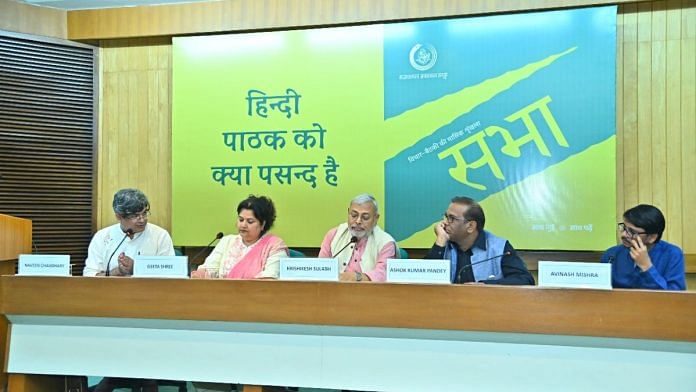A recent gathering of Hindi writers in the national capital became a platform for one-upmanship with panellists indulging in name-calling and deciding who is a writer and who is not. And in a heated discussion, they threw the likes of Kumar Vishwas and Piyush Mishra out of the literature world, asserting they could not be called writers or poets. In a talk at the India Habitat Centre that was supposed to dwell on the question Hindi pathak ko kya pasand hai — what does the Hindi reader like — the speakers turned out to be self-indulgent.
IHC’s Gulmohar Hall, packed with writers, professors, students, journalists and Hindi lovers, saw the reader’s taste being placed lower in the ‘hierarchical relationship’ the two parties enjoy. Panellists insisted that writers prioritise commitment to writing instead of fretting over readers’ perception of their work.
The talk, a monthly brainstorming session called Sabha, lasted for more than 75 minutes. It touched upon a range of issues —the definition of readers, market forces and literary value, and what readers want from writers. The panel comprised authors Ashok Kumar Pandey, Hrishikesh Sulabh and Geeta Shree, and poet and editor Avinash Mishra. The talk was moderated by political novelist Naveen Choudhary.
The changing nature of readers
The speakers unanimously agreed on one thing: if authors can bring life to their writings, they will be read a lot.
“The Hindi writing community is very scared of the readers’ wishes. No writer knows what their reader really wants from them. Writing is a journey that is completed by both the writer and the reader,” said Ashok Kumar Pandey, stressing that the reader just wants to be able to trust what authors write.
Hindi writers tend to perceive themselves as overly elite, he added. “In reality, they are more backward”.
Rajkamal Prakashan, the organiser of the event, conducted a survey among 5,000 readers during the World Book Fair held last month. Participants were asked about the kind of books they liked. Seventy-four per cent readers preferred the feel of printed books. Thirty-four per cent readers said they found it more convenient to buy their books from book fairs. About 31 per cent readers preferred physical bookstores while 29 per cent stuck to the online marketplace.
“The reader seems to be angry with the writer,” said Naveen Choudhury, highlighting the growing distance between authors and their audience.
But that doesn’t mean writers can’t earn credibility, said Hrishikesh Sulabh. If authors can confront the truth of our times with creativity, they will surely attract readers, he added.
The advent of technology and social media has drastically altered the definition of a reader, said Avinash Mishra. According to his observations, modern readers are best categorised as “users”. “Today, people buy books just to show that they have books at home.”
Satyanand Nirupam, editor at Rajkamal Prakashan, chimed in with another point: “The author is now overexposed; their extreme presence is impeding the acceptance of their books by readers.”
Also read:
‘Mehboob and Bewafa’
The Gulmohar Hall at IHC appeared full of purists out to impose their worldview and treat readers as an afterthought. They appeared borderline narcissists, giving their own references and stressing that the reader had no rights. “The role of the reader begins when the book comes into their hands,” said Geeta Shree, quoting veteran Hindi writer Mannu Bhandari.
Shree had to raise her pitch to be heard, though. “This is my political statement: I do not write without an agenda,” she declared loudly. “If the reader accepts it [my work] on my terms, they are mehboob [beloved] and if not, they are bewafa [disloyal],” she added as the hall filled with laughter.
But Choudhary didn’t let Shree walk away with her point. saying that the reader does not want authors to push their own agendas. Why assume the reader to be so innocent, retorted Shree. “Politics is decided the moment a child is born. When a writer is writing, there’s no one in front of them. There shouldn’t be any pressure at the time.”
A curious audience member decided to bind the panelists with one question, insisting that they answer with just one word—”Hindi ka lekhak pathak ko kya dena chahta hain (What is it that a Hindi writer wants to give their reader)?”
The speakers obliged, even if that meant using more words than one — ‘Courage’, ‘literary taste’, ‘presenting the truth in a new way’, ‘giving one’s life experience’.
The hall remained packed till the very end, with audiences glued to the heated conversation. After all, it was about them—the readers.
(Edited by Zoya Bhatti)



